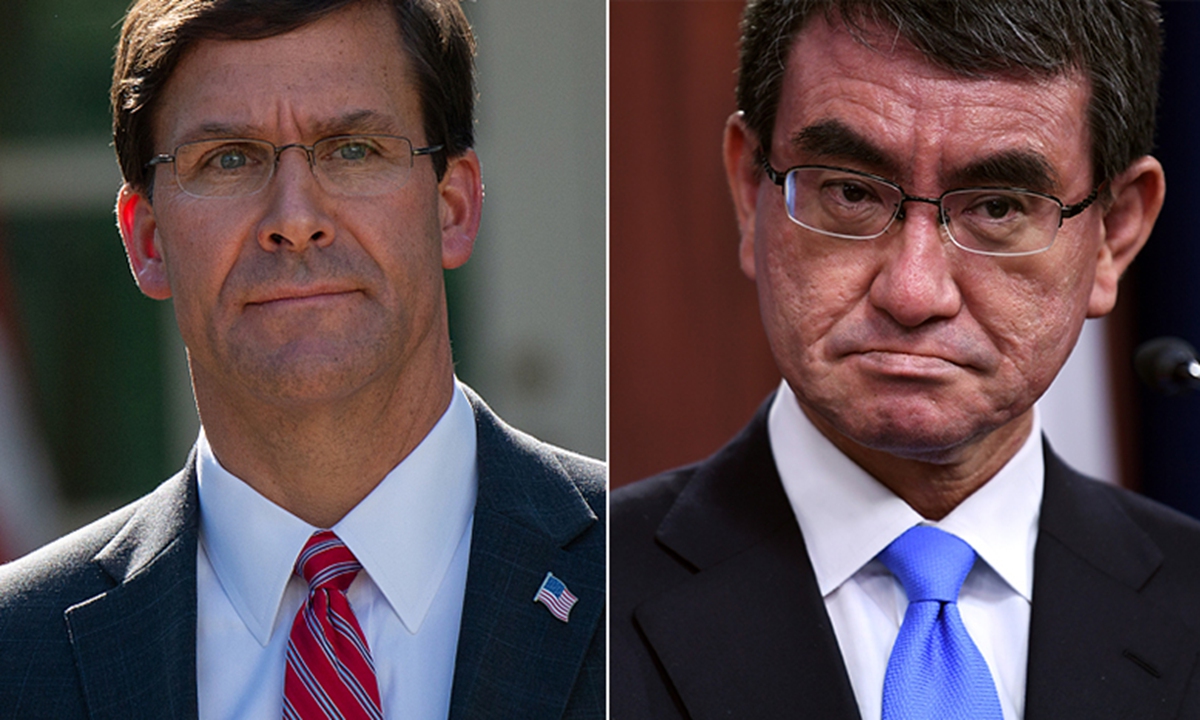Kono visits Guam to meet US counterpart amid upcoming presidential election
By Song Zhongping Source: Global Times Published: 2020/8/29 20:23:40

Photo: CGTN and AFP
Japanese Defense Minister Taro Kono paid a visit to Guam and talked with US Secretary of Defense Mark Esper on Saturday.The timing is mainly due to the upcoming US presidential election which is scheduled in November. In a bid to win the reelection, US President Donald Trump is eager to show some eye-catching diplomatic performances. It will favor Trump if the US can make some remarkable progress in negotiating the cost of keeping US troops stationed in Japan. Furthermore, if Esper can persuade Japan to coordinate with the US in containing China, or deploy medium-range ballistic missiles in Japan, it will be a triumph for the Trump administration in terms of military and diplomacy.
According to media reports, the US will give priority to the deployment of medium-range missiles in Japan. Kyodo News reported that Kono on Saturday said he and Esper agreed during their first talks since January to cooperate to establish a new missile defense system after Japan decided in June to halt plans to deploy the US-developed Aegis Ashore missile defense system. Kono said he explained to Esper about the ongoing talks for alternatives at Japan's National Security Council. Japan is set to indicate a policy on the new missile defense system in September.
Although Kono made such rhetoric, it remains difficult for Japan to totally agree with the US to deploy medium-range missiles or cruise missiles. Japan is worried that it will irritate China, which would result in negative consequences to Japan's further development, especially its economic recovery from the COVID-19 pandemic.
Media reports said Kono and Esper agreed on Saturday that they will keep China's maritime assertiveness in the South China Sea and East China Sea in check. When it comes to the East China Sea, Reuters reported Kono said he had confirmed with Esper that islands in the East China Sea disputed by Japan and China are covered by the US-Japan Security Treaty.
The US is working hard to build an anti-China alliance to contain China. It is trying to woo all countries that have frictions with China. Apart from the key claimants in the South China Sea, Japan, which has a dispute with China on the Diaoyu Islands and the delimitation of the continental shelf in the East China Sea, has also become the country the US is trying to rope in. The reiteration that the Diaoyu Islands are covered under the US-Japan Security Treaty embodies the US' such intent.
Although Japan attaches great importance to the significance of the US-Japan Security Treaty, it would not join the US-lead anti-China coalition to contain China exactly as the US hopes it would. As a neighbor of China, Japan has to carefully consider its national interests before making decisions.
In terms of the South China Sea, as a non-regional country of the area, for what reasons has Japan repeatedly meddled in the disputed region?
Apart from balancing China, Japan has more deep incentives to intervene in the South China Sea issue. The South China Sea is regarded as a "second Persian Gulf," which is rich in natural resources such as petrol and gas. If Japan can gain these resources from the South China Sea, Japan needn't venture as far as the Persian Gulf to seek identical resources, which is both time- and cost- consuming. Japan is equipped with technology, professionals, talents and facilities to coordinate with some countries around the South China Sea to exploit natural resources to meet Japan's energy supply. Restrained by China's nine-dash line, it is not conductive for Japan to engage in cooperating with regional countries in exploring energy. If China's nine-dash line were negated, Japan would have enormously benefited from it.
In addition, amid the tensions in the South China Sea, Japan may seek to sell some of its second-hand weaponry to some regional countries, so as to pursue certain interests.
Japanese Prime Minister Shinzo Abe declared on Friday that he would resign due to health issues, which indeed is a crucial political event. However, where US-Japan ties head in the future depends on who will be the winner of the upcoming US presidential election. If Trump is reelected, there will be some twists and turns in US-Japan relations. Trump's ambition in negotiating the cost of US troops stationed in Japan will create some spats between the two countries. If Joe Biden becomes the next president, Japan can expect to see a tendency for bilateral ties to go more smoothly. This is because Biden underscores restoring trust with US allies.
The author is a Chinese military expert and commentator. opinion@globaltimes.com.cn
Posted in: VIEWPOINT